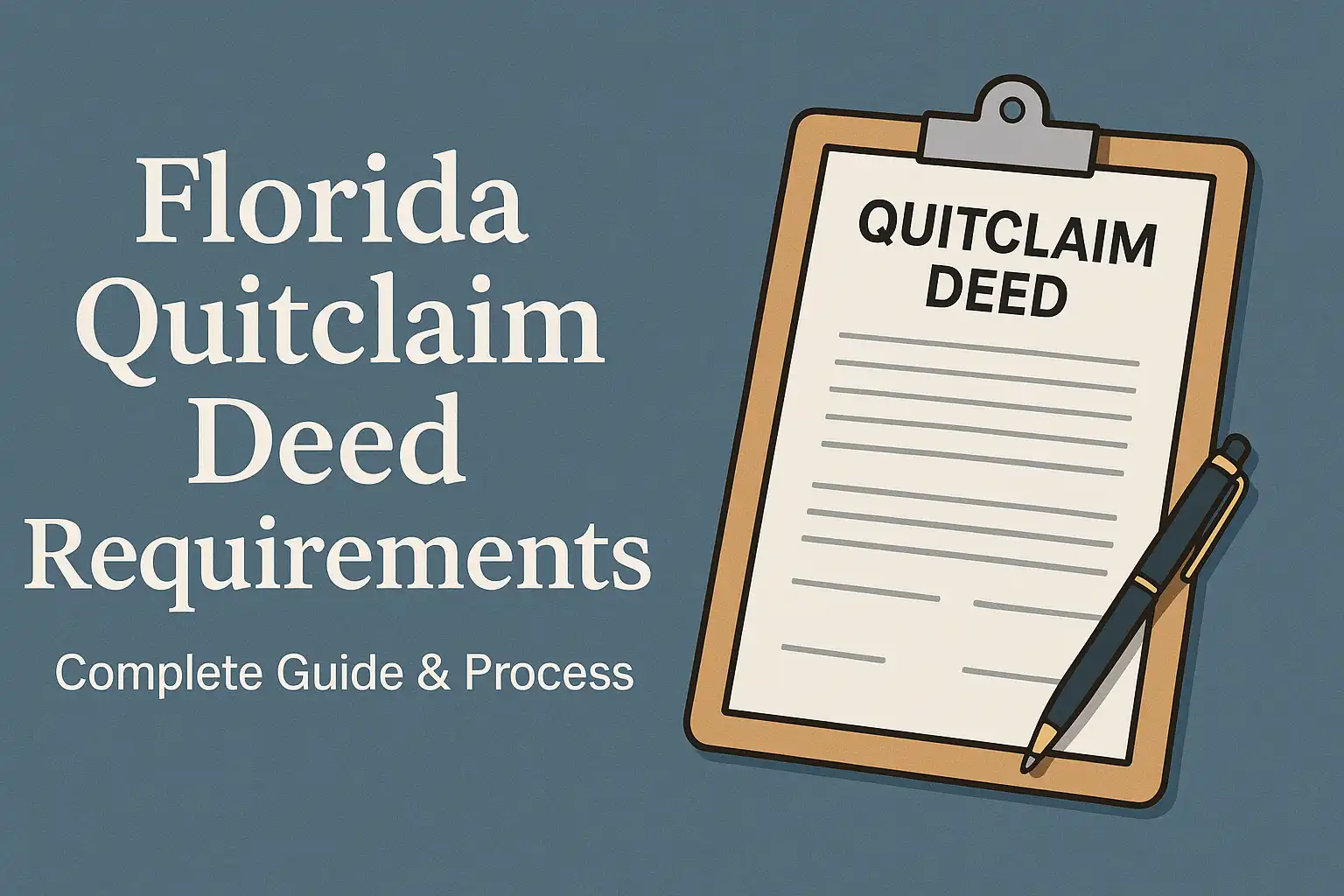
Florida’s robust real estate market, driven by its growing population of over 22 million residents and status as a premier retirement destination, requires clear understanding of property transfer procedures. The state’s unique legal framework combines traditional property law with specific statutory requirements that govern quitclaim deed transactions across all 67 counties.
As the third-largest state by population, Florida processes thousands of property transfers monthly through quitclaim deeds, making it essential for property owners to understand the precise legal requirements. Florida Statutes Chapter 689 governs the execution and recording of deeds, while individual counties maintain specific recording procedures that must be followed for valid transfers.
Florida’s homestead exemption laws, community property considerations for married couples, and complex tax implications create a legal landscape where precision matters. Whether transferring property between family members, adding or removing names from titles, or facilitating estate planning strategies, Florida quitclaim deeds must comply with specific statutory requirements to ensure legal validity and protection.
The state’s recording system operates at the county level, with each county’s Clerk of Court serving as the official recorder of deeds. This decentralized system requires understanding both state-wide statutory requirements and county-specific recording procedures, fees, and documentation standards.
Legal Requirements Under Florida Statutes
Statutory Framework
Florida Statutes Section 689.01 establishes the fundamental requirements for valid deed execution, while Section 689.025 specifically addresses quitclaim deed form requirements. These statutes create binding legal standards that must be met for valid property transfers.
Essential Elements Required by Law:
- Written instrument meeting statutory formatting requirements
- Clear identification of grantor (person transferring property)
- Clear identification of grantee (person receiving property)
- Adequate property description meeting legal standards
- Grantor’s signature executed before authorized witnesses
- Proper notarization by Florida-commissioned notary public
- Recording in the county where property is located
Source: Florida Statutes Section 689.01
Grantor Requirements
Florida law requires grantors to have legal capacity and authority to transfer property. This includes:
Legal Capacity Standards:
- Age of majority (18 years or older)
- Mental competency at time of execution
- Not under legal disability or conservatorship
- Clear title or ownership interest in the property
Married Grantor Considerations: Florida’s homestead laws create specific requirements when married persons transfer homestead property. Florida Constitution Article X, Section 4 requires spousal consent for homestead transfers, making both spouses’ signatures typically necessary even on quitclaim deeds.
Execution Requirements
Florida Statutes Section 689.01 mandates specific execution procedures:
Signature Requirements:
- Grantor must sign in presence of two witnesses
- Witnesses must sign in presence of grantor and each other
- Notary public must acknowledge grantor’s signature
- All signatures must be original (no photocopied signatures accepted)
Witness Qualifications:
- Must be at least 18 years old
- Cannot be spouse of grantor
- Should not be grantee or have interest in the property
- Must be mentally competent and able to testify if needed
Property Description Standards
Legal Description Requirements
Florida recording offices require property descriptions that meet specific legal standards established by Florida Statutes Section 689.025. Inadequate descriptions can result in rejected recordings or future title problems.
Acceptable Description Methods:
Metes and Bounds Descriptions: Most precise method using directional bearings, distances, and physical monuments. Must close mathematically and reference established survey points or recorded plats.
Plat References: Description referencing recorded subdivision plats, including:
- Lot and block numbers
- Subdivision name exactly as recorded
- Plat book and page numbers
- County of recording
Government Survey Descriptions: Using township, range, and section descriptions from the Public Land Survey System where applicable in Florida.
Description Precision Standards
Florida courts have established that property descriptions must be sufficient to identify the property with reasonable certainty. Vague descriptions like “my house on Main Street” are legally insufficient and will be rejected by recording offices.
Required Description Elements:
- Complete street address (insufficient alone but required)
- Legal description meeting one of the acceptable methods above
- County where property is located
- Any applicable unit numbers for condominiums or planned developments
Condominium Property Special Requirements: For condominium units, descriptions must include:
- Unit number as shown in declaration of condominium
- Condominium name exactly as recorded
- Declaration recording information (Official Records Book and Page)
- County of recording
Signature and Notarization Requirements
Florida Notarization Standards
Florida Statutes Chapter 117 governs notarization requirements that directly impact quitclaim deed validity. Non-compliance with notarization standards can invalidate the entire deed.
Notary Public Requirements:
- Must be commissioned by the Florida Department of State
- Must verify grantor’s identity through acceptable identification
- Must witness grantor’s signature personally (no remote notarization for real estate)
- Must complete proper notarial certificate language
Acceptable Identification for Notarization:
- Florida driver’s license or identification card
- Valid U.S. passport
- Other state driver’s license with signature and photo
- Military identification with signature and photo
Notarial Certificate Language: Florida requires specific acknowledgment language. The notary must use substantially the following form:
“State of Florida County of _______
The foregoing instrument was acknowledged before me by means of physical presence this _____ day of _______, 2025, by [Grantor’s Name]. He/She is personally known to me or has produced _________________ as identification.”
Witness Requirements Detail
Florida’s two-witness requirement for deed execution creates additional complexity beyond simple notarization:
Witness Qualifications:
- Both witnesses must be present during grantor’s signature
- Witnesses must sign in each other’s presence
- Cannot be related to grantor by blood or marriage
- Should be disinterested parties with no financial interest in the transaction
Witness Responsibilities:
- Observe grantor’s voluntary signature
- Be available to testify about execution if needed
- Maintain records of the execution event
- Provide contact information for future reference
Recording Procedures and County Requirements
County Recording Systems
Florida’s 67 counties each maintain independent recording systems through the Office of the Clerk of Court. While state statutes provide overarching requirements, counties may impose additional formatting, documentation, and fee requirements.
Major County Variations:
Miami-Dade County:
- Additional formatting requirements for document margins
- Specific indexing requirements for foreign language documents
- Enhanced identification requirements for certain transactions
Orange County (Orlando):
- Electronic recording available through approved providers
- Specific requirements for subdivision and condominium transfers
- Additional documentation for out-of-state grantors
Hillsborough County (Tampa):
- Comprehensive recording standards manual
- Specific requirements for corporate and trust transfers
- Additional witness identification requirements
Recording Process Steps
Pre-Recording Preparation:
- Verify all signature and notarization requirements are complete
- Confirm property description accuracy against current title records
- Calculate and prepare payment for recording fees and taxes
- Gather all required supporting documentation
Recording Submission:
- Submit original deed to appropriate county clerk’s office
- Pay recording fees and documentary stamp taxes
- Provide return mailing address for recorded deed
- Obtain receipt with recording date and official records reference
Post-Recording:
- Receive recorded deed with official recording stamp
- Verify accurate recording in public records
- Distribute copies to relevant parties
- Update property tax records if necessary
Electronic Recording Options
Many Florida counties now offer electronic recording through approved service providers, streamlining the recording process while maintaining legal compliance.
Benefits of Electronic Recording:
- Faster processing times (often same-day recording)
- Reduced transportation and mailing costs
- Automatic calculation of fees and taxes
- Digital delivery of recorded documents
Requirements for Electronic Recording:
- Use of county-approved electronic recording service
- Compliance with digital signature and authentication standards
- Payment through approved electronic payment systems
- Adherence to county-specific electronic formatting requirements
Tax Implications and Documentary Stamp Requirements
Florida Documentary Stamp Tax
Florida Statutes Chapter 201 imposes documentary stamp tax on most property transfers, including quitclaim deeds. Understanding these tax obligations is crucial for legal compliance and avoiding penalties.
Tax Calculation:
- Rate: $0.70 per $100 of consideration or property value
- Minimum tax: $0.70 (even for nominal consideration transfers)
- Calculation based on consideration paid or property value, whichever is greater
Tax Payment Requirements:
- Must be paid at time of recording
- Payment accepted in cash, certified funds, or approved electronic payment
- Receipts must be maintained for tax record purposes
Exemptions and Special Considerations
Common Exemptions:
- Transfers to correct title defects (with proper documentation)
- Transfers pursuant to court orders (with certified copy of order)
- Certain family transfers meeting specific statutory requirements
- Transfers to or from governmental entities (with proper documentation)
Partial Exemptions:
- First-time homebuyer programs (reduced rates with qualification)
- Affordable housing transfers (with proper certification)
- Agricultural property transfers (with agricultural classification)
Property Tax Implications
Homestead Exemption Transfers: When quitclaim deeds involve homestead property, recipients may need to file new homestead exemption applications. Florida’s Save Our Homes assessment limitation may not transfer to new owners, potentially resulting in significant property tax increases.
Assessment Transfer Considerations:
- Transfers between spouses typically maintain existing assessments
- Parent-to-child transfers may qualify for assessment transfer
- Other family transfers require specific documentation and applications
Special Considerations for Florida Property
Homestead Protection Laws
Florida Constitution Article X, Section 4 provides powerful homestead protection that affects quitclaim deed transactions. These protections create both benefits and complications for property transfers.
Homestead Restrictions:
- Cannot be transferred without spousal consent if married
- Subject to specific creditor protection benefits
- May affect ability to mortgage or encumber property
- Requires careful consideration of family law implications
Joint Ownership Considerations:
- Tenancy by entirety protections for married couples
- Right of survivorship implications
- Creditor protection benefits and limitations
- Divorce and separation impact on ownership
Condominium and Planned Development Requirements
Condominium Transfers:
- Must comply with declaration of condominium requirements
- May require association approval or right of first refusal notifications
- Subject to assessment transfer requirements
- May involve additional documentation and fees
Homeowner Association Considerations:
- Deed restrictions and covenant compliance
- Transfer fee requirements
- Architectural review board notifications
- Lien and assessment verification requirements
Environmental and Zoning Considerations
Environmental Concerns:
- Coastal construction control line compliance
- Wetland and environmental protection requirements
- Flood zone designation impacts
- Hurricane and storm damage considerations
Zoning and Land Use:
- Conforming and non-conforming use issues
- Development rights and restrictions
- Agricultural classification maintenance
- Commercial and residential zoning compliance
Common Mistakes and Prevention Strategies
Execution Errors
Signature and Witness Problems:
- Insufficient witness qualifications or presence
- Improper notarization or identification
- Missing spouse signatures on homestead property
- Corporate authorization and signature issues
Prevention Strategies:
- Use qualified legal counsel for complex transactions
- Verify all parties’ authority and capacity
- Ensure proper witness qualification and availability
- Maintain detailed execution documentation
Description and Recording Errors
Property Description Issues:
- Inadequate or legally insufficient descriptions
- Incorrect legal references or survey information
- Missing condominium or subdivision details
- Boundary and easement description problems
Recording Compliance Problems:
- Incorrect county for recording
- Insufficient fees or tax payments
- Missing required supporting documentation
- Formatting and margin requirement violations
Tax and Exemption Mistakes
Documentary Stamp Tax Errors:
- Incorrect calculation of tax obligations
- Failure to claim available exemptions
- Inadequate documentation for exemption claims
- Late payment penalties and interest
Property Tax Oversights:
- Failure to transfer or apply for homestead exemptions
- Incorrect assessment transfer applications
- Missing agricultural or other special classification transfers
- Delayed notification to property tax authorities
Professional Resources and Expert Consultation
When to Consult Legal Counsel
Complex Transaction Indicators:
- Substantial property values or complex ownership structures
- Business or investment property transfers
- Estate planning or tax strategy implications
- Dispute resolution or title problem correction
Legal Expertise Benefits:
- Comprehensive title examination and problem resolution
- Tax strategy optimization and exemption maximization
- Compliance with complex statutory and regulatory requirements
- Protection against future legal complications
Title Insurance and Professional Services
Title Insurance Considerations:
- Protection against unknown title defects
- Lender requirements for financed properties
- Coverage for survey and boundary issues
- Legal defense for covered title claims
Professional Service Integration: For comprehensive transaction management, consider coordinating with qualified professionals including real estate attorneys, title companies, and tax advisors. When complex legal issues arise or substantial property values are involved, professional services through established providers like Deeds.com can ensure proper compliance and protection.
Real Estate Professional Resources
Florida Bar Association Resources:
- Real Property, Probate and Trust Law Section
- Continuing legal education programs
- Attorney referral services
- Professional standards and ethics guidance
Industry Organizations:
- Florida Land Title Association
- Florida Association of Realtors
- Florida Bankers Association
- Florida Society of Certified Public Accountants
Step-by-Step Florida Quitclaim Deed Process
Phase 1: Pre-Execution Preparation
Step 1: Property Information Gathering
- Obtain current deed and title information
- Verify legal property description accuracy
- Confirm current ownership and any liens or encumbrances
- Research homestead status and exemption eligibility
Step 2: Legal Compliance Verification
- Confirm all parties’ legal capacity and authority
- Verify marriage status and spousal consent requirements
- Review applicable exemptions and tax implications
- Assess need for professional legal consultation
Step 3: Document Preparation
- Prepare quitclaim deed using proper Florida statutory language
- Include accurate property description meeting legal standards
- Verify all parties’ names and addresses
- Review deed for completeness and accuracy
Phase 2: Execution and Notarization
Step 4: Execution Arrangements
- Schedule execution with all required parties present
- Arrange for two qualified witnesses
- Confirm notary public availability and commission status
- Prepare acceptable identification for all signers
Step 5: Deed Execution
- Grantor signs deed in presence of witnesses and notary
- Witnesses sign in presence of grantor and each other
- Notary completes acknowledgment and affixes seal
- Verify all signatures are original and properly executed
Phase 3: Recording and Completion
Step 6: Recording Preparation
- Calculate documentary stamp tax obligations
- Prepare payment for recording fees and taxes
- Gather any required supporting documentation
- Verify county-specific recording requirements
Step 7: Recording Process
- Submit deed to appropriate county clerk’s office
- Pay all required fees and taxes
- Provide return address for recorded deed
- Obtain receipt with recording information
Step 8: Post-Recording Actions
- Verify accurate recording in public records
- Update property tax records and exemption applications
- Distribute copies to relevant parties
- Maintain records for future reference
Timeline and Processing Expectations
Typical Processing Timeline:
- Document preparation: 1-3 business days
- Execution coordination: 1-2 business days
- Recording processing: 1-5 business days (varies by county)
- Return of recorded deed: 5-10 business days
Expedited Processing Options:
- Electronic recording (where available): Same day processing
- In-person recording: Same day processing
- Priority mail services: 2-3 business days for return
Conclusion
Florida quitclaim deed requirements reflect the state’s commitment to protecting property rights while facilitating efficient real estate transfers. The combination of specific statutory requirements, county-level recording procedures, and complex tax implications requires careful attention to legal compliance and procedural accuracy.
Success in Florida quitclaim deed transactions depends on understanding the interplay between state law requirements, county recording procedures, and individual property characteristics. From the two-witness execution requirements to the documentary stamp tax obligations, each element serves important legal and practical purposes in protecting property rights and maintaining accurate public records.
Whether facilitating family transfers, estate planning strategies, or business transactions, Florida quitclaim deeds must meet precise legal standards to ensure validity and enforceability. The state’s robust legal framework provides comprehensive protection for property owners while requiring careful attention to procedural compliance and professional guidance when appropriate.
For property owners navigating Florida’s quitclaim deed requirements, the investment in proper legal compliance and professional guidance pays dividends in transaction security, tax optimization, and long-term property protection. Understanding these requirements empowers property owners to make informed decisions while protecting their valuable real estate investments in the dynamic Florida market.


Leave a Reply